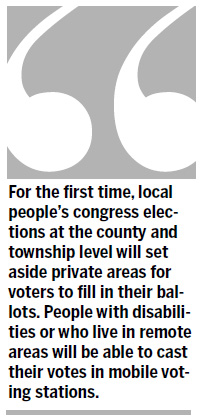Grassroots democracy
By Wang Lei (China Daily) Updated: 2011-05-19 07:56
Changes in voting for people's congress deputies at county and township levels will balance urban and rural representation
The new round of local people's congress elections at the county and township level will begin on July 1.
It will be the first time that both rural and urban areas have the same ratio of deputies to the represented population since the amendment of Election Law in March 2010. Previously the law stipulated that each rural deputy represented a population four times that of an urban deputy.
Statistics show that more than 2 million deputies will be elected this time, involving more than 2,000 county-level administrations and more than 30,000 township-level ones. There will be more than 900 million voters at the county level, and more than 600 million voters at the township level.
|
||||
According to the revision of the Election Law passed at the third Plenary Session of the 11th National People's Congress on March 14, 2010, there will be several major changes in the coming elections.
First, aside from equalizing the representation of rural and urban deputies, whereby every deputy in every electoral district will represent basically a population of the same size, there are other improvements in the rules of representation that are aimed at ensuring the presence of deputies from various regions and various ethnic groups.
There should also be at least one deputy for counties and townships with a small population, and the proportion of people represented will be decided by the standing committee of the people's congress at corresponding levels.
Second, the ratio of grassroots deputies to the people's congress will be increased this time, especially deputies who are workers, farmers and intellectuals.
Third, the revised Election Law guarantees electors' privacy better. For the first time, local people's congress elections at the county and township level will set aside private areas for voters to fill in their ballots. People with disabilities or who live in remote areas will be able to cast their votes in mobile voting stations. Voters may also entrust other people to vote on their behalf.














